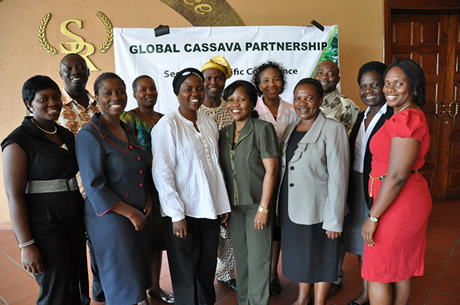
Global leaders in cassava research have drawn up an action plan to unleash the potential of cassava as a key crop to boost food security, tackle poverty and address a changing climate.
Over half-a-billion people in sub-Saharan Africa eat cassava every day, and it is a crucial industrial crop grown by small holder farmers in Asia and Latin America. Recent research has also shown that it could be one of the most climate-smart crops farmers can grow, tolerating drought and in some cases increasing productivity as temperatures rise. But currently cassava yields hover at just 10 percent of the crop’s potential, leaving significant room for improving livelihoods and incomes.
Participants at the second scientific meeting of the Global Cassava Partnership for the 21st Century (GCP21), in Kampala, Uganda (June 18-22), heard that tackling devastating crop pests and diseases, supporting genetic research of cassava, and improving on-farm practices, among other measures, will be critical to improving productivity and incomes.
“The potential of cassava is truly phenomenal. There is no other crop that offers so much promise to ordering xanax online so many people in so many parts of the world,” said Dr. Claude Fauquet, Co-Chair of GCP 21. “I am energized by the significant progress we have made, but caution that we must continue to monitor and anticipate challenges before they can escalate causing suffering for millions.”
Joe Tohme, Agrobiodiversity Research Area Director at the International Center for Tropical Agriculture (CIAT) and co-chair of GCP21, agreed: “There’s no doubt that if the international community is really serious about tackling food insecurity, overcoming poverty and helping smallholder farmers adapt to climate change, they have to get serious about cassava,“ he said. “One urgent task is to tackle cassava’s susceptibility to pest and disease outbreaks – the crop’s ‘Achilles Heel’, which is a major obstacle to maximizing the potential of cassava for improving livelihoods in Africa, Asia and Latin America.”
For key action points from GCP21 II, visit the Danforth Center website
Participating AWARD Fellows included:
- Dr. Foluke Abimbola Aderemi, Nigeria
- Dr. Bolanle Akinwande, Nigeria
- Teddy Amuge, Uganda
- Ugo Chijioke, Nigeria
- Vincentia Naa Ayele Hammond, Ghana
- Dr. Emma Kambewa, Malawi
- Dr. Salome Mutayoba, Tanzania
- Dr. Folasayo Titilola Fayose, Nigeria
- Dr. Damaris Odeny, Kenya
- Olapeju Onadipe, Nigeria
- Dr. Josephine Songa, AWARD
- Deborah Wendiro, Uganda
AWARD Mentors
- Professor Malachy O. Akoroda, Agronomy Department, Faculty of Agriculture and Forestry, University of Ibadan, Nigeria
- Professor Sanni Lateef Oladimeji, University of Agriculture, Abeokuta, Nigeria
- Professor Emmanuel Ohene Afoakwa, Department of Nutrition and Food Science, University of Ghana
